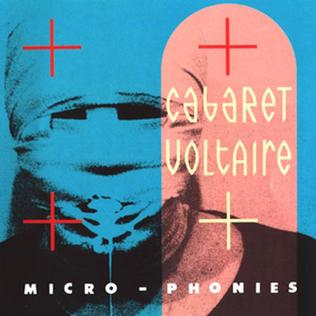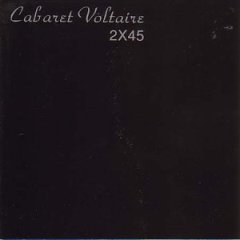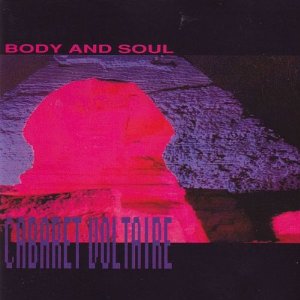
Cabaret Voltaire was an English music group formed in Sheffield in 1973 and initially composed of Stephen Mallinder, Richard H. Kirk, and Chris Watson. The group was named after the Cabaret Voltaire, the Zürich nightclub that served as a centre for the early Dada movement.
Acid Horse was a one-off collaborative side project between two industrial music pioneers, Ministry and Cabaret Voltaire. Only one single, "No Name, No Slogan", was released in 1989 on Wax Trax! Records. The band name is a combination of the slang terms for LSD (acid) and heroin (horse), as well as a play on the title of the then-popular acid house movement.

Richard Harold Kirk was an English musician who specialised in electronic music. His career began as a co-founder of the influential industrial music band Cabaret Voltaire, formed in 1973. He subsequently released projects under his own name and a number of aliases, and was a member of various groups such as Sweet Exorcist. Kirk was considered a major figure in the creation of industrial music.
Stephen William Mallinder is an English artist and musician who was a founding member of Cabaret Voltaire, and went on to work as Sassi & Loco, the Ku-Ling Bros., Hey, Rube!, Wrangler, and Creep Show.

Three Mantras is the second studio album by English band Cabaret Voltaire. It was released in May 1980, through record label Rough Trade.

Extended Play is an extended play and the debut release by English industrial band Cabaret Voltaire. It was released in November 1978, through record label Rough Trade.

Micro-Phonies is the sixth full-length studio album by British electronic band Cabaret Voltaire. Released October 29, 1984, the album was the group's most mainstream release to date, with the singles "Sensoria" and "James Brown" gaining popularity, especially the former, due to the music video finding MTV airplay. The album sees Cabaret Voltaire continuing to change, pursuing the more electro and synthpop-oriented direction they had started shifting towards on The Crackdown.

Drinking Gasoline is a 1985 EP release by Cabaret Voltaire, originally released on the Some Bizzare label and distributed through Virgin Records. All four tracks are featured on the band's "Gasoline in Your Eye" videocassette, also issued in 1985. All known copies of the original UK pressing had labels on the wrong discs It peaked at #71 in the UK.

2x45 is the fourth studio album by English band Cabaret Voltaire. It was released in May 1982, through record label Rough Trade.

Code is the eighth studio album by English electronic band Cabaret Voltaire, released in October 1987.

Mix-Up is the debut studio album by English band Cabaret Voltaire. It was released on 23 October 1979, through record label Rough Trade.

Live at the Y.M.C.A 27-10-79 is a live album by industrial/post-punk band Cabaret Voltaire, recorded in 1979 and originally released in 1980 by Rough Trade. It was re-released on CD in 1990 on Mute Records in the UK and on Restless Records in the US. The album contains a cover of The Velvet Underground's "Here She Comes Now" from their album White Light/White Heat.

The Crackdown is the fifth studio album by English electronic band Cabaret Voltaire, released in August 1983 jointly through record labels Some Bizzare and Virgin. It was produced by the band themselves and Flood.

Red Mecca is the third studio album by English band Cabaret Voltaire. It was released in September 1981, through record label Rough Trade.

A Factory Sample is a 7-inch double sampler EP released on 24 December 1978 by Factory Records of Manchester, England. Funded by a small inheritance which had recently been bequeathed to Tony Wilson, it was the first vinyl recording to be released by the label. The cover of the EP is made of rice paper, dyed silver and sealed inside a thin plastic bag.

Hai! is a 1982 live album by the U.K. industrial band Cabaret Voltaire. It was recorded at the Tsubaki House in Tokyo, Japan on 23 March 1982, and was released on CD in 1991 by Mute Records Ltd. The original master tapes being lost, the CD was transferred from a vinyl copy.

Johnny Yesno: The Original Soundtrack from the Motion Picture is an album by the Industrial band Cabaret Voltaire. It was made as a soundtrack to Peter Care's movie of the same title, which in turn led to Peter Care directing the video for Cabaret Voltaire's hit song "Sensoria". This started a music video-making career for Peter Care, who has since then directed films for R.E.M., Bruce Springsteen, Roy Orbison, and Depeche Mode, amongst others.

The Covenant, The Sword and the Arm of the Lord is the seventh full-length studio album by the electronic band Cabaret Voltaire. The album was released through Some Bizzare Records in November 1985. The album's title was shortened to The Arm of the Lord for the United States.

Groovy, Laidback and Nasty is the ninth studio album by English electronic band Cabaret Voltaire, released in April 1990 by record label Parlophone.

Body and Soul is the tenth studio album by English electronic band Cabaret Voltaire, released in March 1991 by Belgium-based label Les Disques du Crépuscule. Music historian Colin Larkin wrote that the album was "well-received" and "consolidated Cabaret Voltaire's pivotal position on the UK's dance scene". Martin Aston in Q Magazine called the album "nothing radical but by their own standards, a rewarding leap sideways."


















